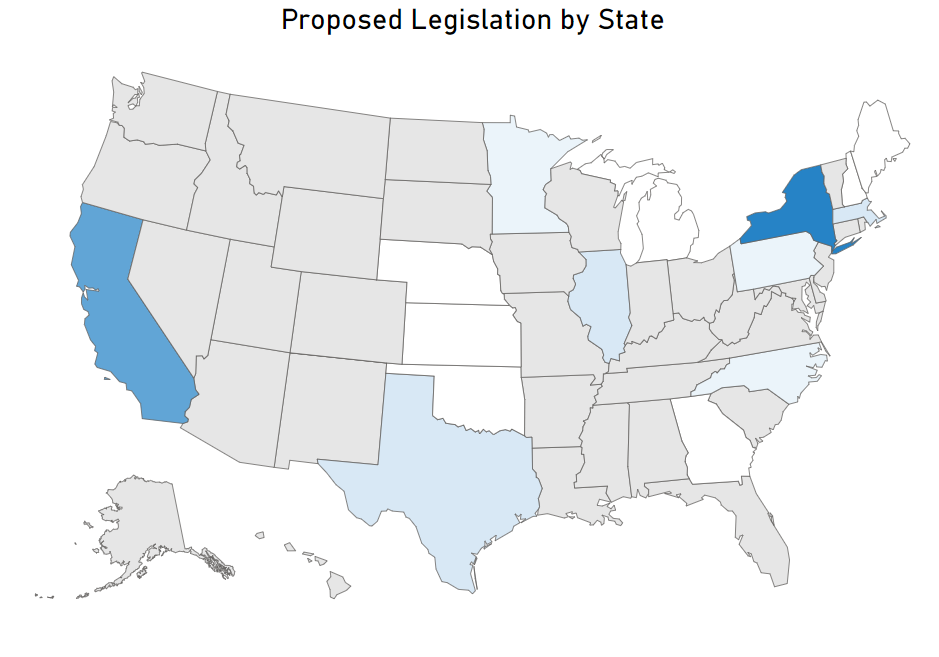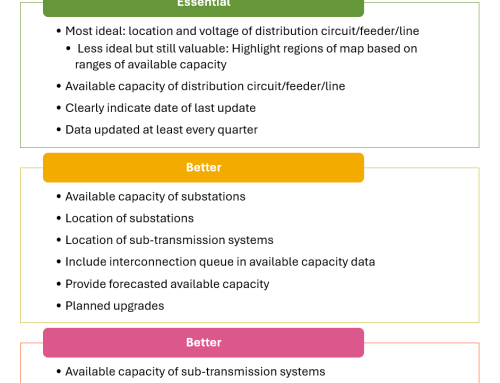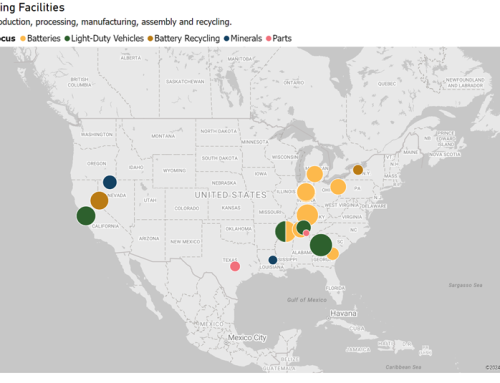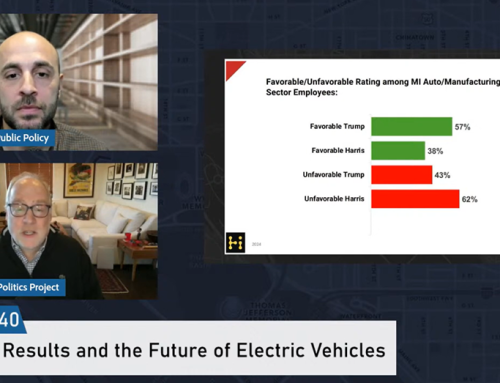
In the map above, the darker-shaded states represent a higher number of proposed laws.
For all the policy wonks and EV advocates, it’s time for another legislative update. Since our last update in March, we’ve captured a ton of new EV-related bills moving through State legislatures. Here are a few trends that caught our eye. As a reminder you can always view all the bills we are tracking on the Proposed Legislation page of the State Policy Dashboard.
States Aim for 2035
First, a cross-section of states have proposed legislation to transition to electric school buses. The following bills all establish a requirement that newly purchased or contracted school buses must be electric or zero-emissions by 2035:
Additionally, Illinois’ Senate Bill 2154 appears to have a stronger target: this bill proposes that newly purchased, contracted, or leased school buses must be electric beginning in 2028, and that all school buses that provide transportation to enrolled students must be electric beginning in 2035.
The World Resources Institute’s Electric School Bus Initiative has a number of resources dedicated to electric school bus adoption in the United States, including this very handy article tracking electric school bus legislation.
Clean fuel standards
In our scan of recently proposed legislation, we came across four more states that have introduced clean fuel standards, or low-carbon fuel standards.
-
Michigan’s Senate Bill 275 proposes to establish a clean fuel standard that seeks to reduce carbon intensity from on-road transportation by 25 percent by 2035.
-
Minnesota’s Clean Transportation Standard Act, or HF 2602, proposes to reduce carbon intensity from on-road transportation by 25 percent by 2030, 75 percent by 2040, and 100 percent by 2050.
-
Illinois’ Senate Bill 1556 proposes to establish a clean fuel standard that will reduce carbon intensity from on-road transportation 20 percent by 2038
-
New York’s Senate Bill 1292 establishes a clean fuel standard that will reduce carbon intensity from on-road transportation by 20 percent by 2031
These policies offer a mix of incentives for EV adoption and help drive down transportation emissions. So far in our tracking, three other states have enacted a low-carbon fuel standard including California, Oregon, and Washington.
Bills on the thornier side
EV fees continue to make a presence in EV policy. Last time, we discussed Georgia’s contentious Senate Bill 146, which seeks to implement an excise tax of 2.4 cents per kWh on public charging. Despite drawing criticism, the bill passed both chambers of the legislature and was signed by Governor Kemp earlier this month, becoming law. In other news, Texas has recently moved forward with a similarly controversial bill that imposes additional EV fees. Texas’ Senate Bill 505 implements a $400 fee to register an EV and an additional $200 fee to renew a registration. The bill quickly made its way through the State legislature and was enacted by the Governor last week.
Additionally, Montana enacted a trifecta of EV fees. HB439 implements a one-time registration fee starting at $260 for BEVs and $140 for PHEVs while HB60 imposes an annual registration fee for EVs starting at $130 for BEVs and $70 for PHEVs. Both fees are increased for heavier vehicles. Lastly, HB55 establishes a tax of $0.03 per kWh for electricity sold at public charging stations. All three bills were signed into law this spring.
Lastly, Maine legislators introduced an anti-EV bill in April. Though unlikely to hold up, House Bill 1623 proposes to prohibit all state subsidies for electric vehicles in the state of Maine. In no surprise, this proposal has chalked up immense dissent from transportation electrification advocates – see this written testimony submitted by Sierra Club’s Maine Chapter opposing the bill.
See the full list below for other state legislation developments, or dive in deeper on the State Policy Dashboard. If we missed anything, respond to this email and let us know!
Active
- California: SB425. Increases the incentive for zero-emission pickup trucks under the Clean Vehicle Rebate Project, to be $2,500 more than the rebates provided for other zero-emission vehicles (currently $1,000 more).
- California: AB1349. Requires charging station operators who recieve a state grant to provide station data for their entire network free of charge to third-party software developers via API starting in 2024.
- California: SB410. The Powering Up Californians Act requires seeks to improve utility planning for building and vehicle electrification by establishing at work group at the Public Utilities Commission and requiring the PUC to set deadlines and transparency measures to better track utility progress on widespread electrification.
- California: SB233. This bill would require that, beginning in model year 2027, all new electric vehicles sold in California be bidirectional capable, including light-duty motor vehicles and schoolbuses, except as exempted by the state board. The bill would first require a working group and report by the California Energy Commission.
- California: SB30. Bill requires CalTrans to develop and design light-duty zero-emission vehicle charging and fueling station signage to be placed along state highways.
- California: SB823. Establishes a grant program for a third party implementer to provide low-income residents with a discounted payment card for use at publicly available electric vehicle charging stations.
- California: AB579. Requires all newly purchased school buses to be zero-emission vehicles starting in 2035.
- California: AB591. Bill relates to universal connectors and public accessibility for electric vehicle service equipment
- California: SB507. Increases the goal set for the purposes of the California Energy Commission’s statewide infrastructure assessment from 5 million ZEVs on California roads by 2030 to 8 million ZEVs.
- Delaware: SB103: Requires that newly constructed single-family and multi-family residential dwellings include certain electric vehicle charging infrastructure.
- District of Columbia: B25-0106. The Comprehensive Electric Vehicle Infrastructure Access, Readiness, and Sustainability Amendment Act of 2023 would expand the District’s Electric Vehicle Charging Station Pilot Program, direct DDOT to develop an EV Infrastructure Deployment and Management Plan, establish an EV Charging grant program, require new or upgraded commercial and MUDs with parking lots to include EV charging infrastructure, creates a permitting requirement for new single-family homes to be EV-charging ready, gives tenants the right to install EV charging stations, and allows condo associations to install EV charging stations.
- Illinois: SB1556. Requires the Pollution Control Board to adopt a clean transportation standard to reduce carbon intensity from the on-road transportation sector by 20% by 2038.
- Illinois: SB2154. Requires all new school bus purchases to be electric vehicles starting in 2028. Provides that all school buses that operate within an equity investment eligible community are electric by 2030 and all other school buses are electric by 2035.
- Illinois: SB40. The “Electric Vehicle Charging Act” requires new residential construction to include electric vehicle capable parking s Save paces or installed electric vehicle supply equipment.
- Kansas: HB2004. Imposes a tax of $0.03 per kWh on electricity provided by public EV charging stations.
- Maine: LD1623. An act that prohibits all state subsidies for electric vehicles
- Massachusetts: S2121. Requires dealers to only sell plug-in electric vehicles starting in 2027 and only sell zero-emission vehicles starting in 2030. Requires the MBTA to only procure electric buses starting in 2024 and to operate a fully electric bus fleet by 2030. Regional transit authorities shall only procure electric buses starting in 2027 and operate a fully electric bus fleet by 2035.
- Massachusetts: S2218. Requires public fleets, including school buses, to be: 50% electric by 2025, 75% electric by 2030, and 100% electric by 2035
- Massachusetts: HD2530. Establishes safety standards and regulations for electric vehicle charging stations including accessbility and charger reliability
- Michigan: SB275. Establishes a clean fuel standard that will decrease the carbon intensity of fuels in Michigan by 25% by 2035.
- Minnesota: SF2584. Establishes a clean transportation standard to reduce the carbon intensity of transportation fuel supplied to Minnesota by 25 percent by the end of 2030, 75 percent by the end of 2040, and by 100 percent by the end of 2050.
- Minnesota: HF413. Establishes requirement for state fleet to purchase EVs unless total cost of ownership exceeds 110 percent of comparative non-EV, requires EV training for motor vehicle dealer employees, requires utilities to file plans with Public Utilities Commission to promote EVs, establishes $20 million rebate program offering $2,500 for new EV and $500 for used EV, and establishes $4 million grant program for automobile dealers for certification allowing electric vehicle sales.
- Nebraska: LB505. Imposes annual fee of $200 for BEVs and $125 for PHEVs and an excise tax on electricity used as a motor fuel of 3 cents per kWh.
- New Hampshire: SB52. Bill establishes regulations of electric vehicle charging stations including universal access and allows charging service providers to sell electricity without being regulated as a utility.
- New York: S6301. Requires new or renovated distribution centers 50,000 square feet or more to be equipped with electric vehicle charging stations.
- New York: S1292. Establishes the clean fuel standard of 2023, intended to reduce carbon intensity from on-road transportation by 20% by 2031.
- New York: S1535. Requires certain state owned and operated parking garages, open parking lots and other parking facilities to install and maintain charging stations for plug-in electric vehicles
- New York: A7091. Requires electric vehicle charging stations and electric vehicle capable parking spaces to accommodate wheelchair accessible electric vehicles
- New York: A1122. Requires commercial garages containing electric vehicle charging stations to ensure public access to such charging stations
- New York: A5687. Requires NYSERDA to develop a real-time mobile application with a map with information on electric vehicle charging stations.
- New York: S489. Requires NYSERDA to develop a comprehensive electric vehicle fast charging station implementation plan
- New York: S487. Directs the New York State Department of Transportation, in conjunction with the New York State Energy Research and Development Authority and the New York Power Authority, to promulgate rules and regulations for the standardization of public charging stations for electric vehicles.
- New York: S110. Requires commercial garages containing electric vehicle charging stations to ensure public access to such charging stations
- New York: A1721. Requires public service commission to establish electric vehicle charging station reliability reporting and standards by January 1, 2025.
- New York: S1736. Requires electric vehicle charging stations and level 2 electric vehicle capable parking spaces at certain residential and commercial buildings.
- New York: S749. Requires at least one electric charging station for every one hundred fifty thousand New York state residents
- North Carolina: HB318. Requires that new residential construction of one- and two-family dwellings includes an electic circuit capable of accommodating an electric vehicle charging device
- North Carolina: SB316. Establishes regulations for electric vehicle charging stations, such as designated parking spaces for electric vehicles, signage for electric vehicle parking spaces, and pentalties for violations of mentioned regulations.
- Oklahoma: SB502. The Electric Vehicle Charging Act allows charging service providers to sell electricity by the kWh and requires utilities to establish a public charging rate.
- Pennsylvania: HB317. Establishes the Green Vehicle Pilot Program
- Pennsylvania: SB157. Establishes a Residential Electric Vehicle Charging Station Tax Credit
- Texas: SB1732. Bill establishes a standard for EV charging stations, standard must have a widely compatible charging connector or plug
- Texas: HB3014. Exempts electric vehicles from emissions and exhaust inspection requirements
- Texas: HB821. Allows a state agency to authorize a charging provider to place and maintain electric vehicle charging equipment on state property and requires the charging provider to use a metering device.
Enacted
- Georgia: SB146. Creates an charging tax on public EV charging and allows charging service providers to sell electricity by the kWh.
- Maryland: HB550. Extends the Electric Vehicle Recharging Equipment Program through fiscal year 2026, repeals rebates for retail service station dealers, and repeals rebate limit.
- Maryland: HB830. Modifies requirements for EVSE parking spaces in new residential construction.
- Maryland: SB224. Requires the Department of the Environment to adopt Advanced Clean Trucks regulations on or before December 1, 2023 to go into effect in Model Year 2027. Also requires a needs assessment, establishes a grant program, and allows the department to delay adoption if needed.
- Maryland: HB230. Requires the Department of the Environment to adopt regulations on or before December 1, 2023, establishing requirements for the sale of new zero-emission medium- and heavy-duty vehicles in the State
- Maryland: HB123. Authorizing certain plug-in electric drive vehicles for which a permit has been issued by the Motor Vehicle Administration to use high occupancy vehicle (HOV) lanes regardless of the number of passengers in the vehicles
- Maryland: HB834. Requires the Public Service Commission to expand the EV Pilot Program to allow participating electric companies to install EV charging stations in multifamily dwellings in underserved communities and requires utility-operated EV charging stations achieve 97% uptime.
- Mississippi: HB401. Bans direct sales of EVs
- Montana: HB55. Establishes a tax of $0.03 per kWh on electricity used to charge an EV at a public charging station.
- Montana: HB60. Imposes an annual EV registration fee starting at $130 for BEVs and $70 for PHEVs and increasing with vehicle class
- Montana: HB439. Bill creates a one-time fee of $260 to $380 for BEVs and $140 to $200 for PHEVs for their permanent registration.
- Texas: SB505. Imposes an annual EV registration fee of $200, and an initial registration fee of $400.
Adjourned
- Colorado: HB23-1233. Bill requires multifamily buildings to be electric vehicle capable and EV ready.
- Delaware: SB103. Requires that newly constructed single-family and multi-family residential dwellings include certain electric vehicle charging infrastructure.
- Delaware: HB9. This Act requires that all passenger vehicles and light duty vehicles owned and operated by the State be zero emission vehicles by 2040 by requiring increasing volumes of zero emission vehicles every few years.
- Hawaii: HB346. Requires that new state facilities be designed to be electric vehicle charger-ready with 25% of parking stalls electric vehicle charger-ready.
- Hawaii: SB970. Requires the Department of Education to establish goal to transition to zero emission vehicles for all student transportation by 2035
- Hawaii: SB457. Requires all state, county, and private bus operators to upgrade to zero emission buses by 2045
- Indiana: SB241. Requires the BMV to submit a report annually to the Indiana utility regulatory commission that includes information regarding the number of electric vehicles registered by county
- Maryland: HB312. Establishing a fee of $14 every 2 years for vehicles not subject to the Vehicle Emissions Inspection Program. Funds are used to provide rebates for EVs and EVSE.
- Maryland: HB101. Allows condiminiums to grant leases in excess of 1 year for the installation and use of leased clean energy equipment.
- Maryland: HB7. Altering the Electric Vehicle Recharging Equipment Rebate Program by extending the duration of the Program through fiscal year 2027, increasing the total amount of rebates issued annually under the Program to $2,000,000.
- Washington: SB5431. Requires that beginning 2035, new school bus purchases must be zero emission vehicles and establishes a zero emission school bus grant program.
- Washington: HB1368. Requires all school buses purchased in the state to be zero-emissions by 2035 and establishes an account to fund the purchase of zero emission school buses.
- West Virginia: HB2260. Repeals additional registration fees for alternative fuel vehicles
- Wyoming: SJ0004. A bill that seeks to phase out new electric vehicle sales by 2035
Failed
- Florida: HB1591. Bill that requires Public Service Commission to adopt rules related to electric vehicle charging. Prohibits utilities from using rate-based funds to own and operate charging stations.
- Virginia: HB1790. Creates a tax credit for taxable years 2023 through 2027 for expenses incurred in connection with installing qualified electric vehicle charging equipment in the Commonwealth in an amount equal to 30 percent of the cost of purchasing and installing such equipment during the taxable year.
- Virginia: SB1312. Provides that any locality may by ordinance require electric vehicle charging stations as part of subdivision or site plan approval for a development containing commercial, industrial, or multifamily residential uses with a density of seven residential dwelling units per acre or greater.
- Virginia: HB2468. Streamlines process for direct sales manufacturers to operate in Virginia
- Virginia: HB1378. Repeals the requirement that the State Air Pollution Control Board implement a low-emissions and zero-emissions vehicle program for motor vehicles with a model year of 2025 and later. The bill prohibits the Board from adopting or enforcing any model year standards related to control of emissions from new motor vehicles or new motor vehicle engines
- Virginia: HB1588. Creates the Electric Vehicle Rural Infrastructure Program and Fund to assist private developers with non-utility costs associated with the installation of electric vehicle charging stations. The bill provides that a private developer is eligible to receive grants of 70 percent of such non-utility costs for electric vehicle charging stations installed in a city or county that meets the criteria of a distressed locality as provided in the bill and caps the total amount of grants awarded in any fiscal year at $25 million.
- Virginia: HB1766. Requires the Board of Housing and Community Development to promulgate regulations for electric vehicle charging infrastructure standards for multifamily residential housing construction projects consisting of more than 25 residential dwelling units. The standards shall require a developer of such multifamily residential housing construction projects to ensure that at least 25 percent of the available parking spaces are electric vehicle charging ready during the design and construction process.
- West Virginia: SB212. Establishing rebate for registration fees for plug-in hybrid vehicles


